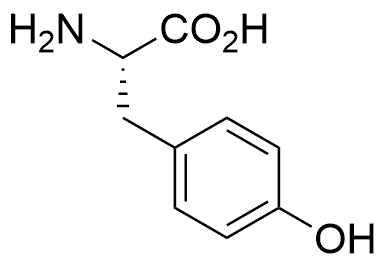L-Tyrosine, from non-animal source, suitable for cell culture is widely utilized in research focused on:
- Cell Culture Media: It serves as a vital amino acid in cell culture media, promoting cell growth and viability, particularly for neuronal and other specialized cells.
- Neurotransmitter Precursor: This compound is crucial in the synthesis of neurotransmitters like dopamine, norepinephrine, and epinephrine, making it valuable in neurobiology studies.
- Dietary Supplements: L-Tyrosine is commonly used in dietary supplements aimed at enhancing cognitive function and reducing stress, appealing to health-conscious consumers.
- Pharmaceutical Applications: It is explored in drug formulations for conditions like depression and anxiety, due to its role in neurotransmitter production, providing a natural alternative to synthetic compounds.
- Research in Metabolism: This amino acid is studied for its role in metabolic pathways, offering insights into conditions like phenylketonuria (PKU) and potential dietary interventions.
General Information
Properties
Safety and Regulations
Applications
L-Tyrosine, from non-animal source, suitable for cell culture is widely utilized in research focused on:
- Cell Culture Media: It serves as a vital amino acid in cell culture media, promoting cell growth and viability, particularly for neuronal and other specialized cells.
- Neurotransmitter Precursor: This compound is crucial in the synthesis of neurotransmitters like dopamine, norepinephrine, and epinephrine, making it valuable in neurobiology studies.
- Dietary Supplements: L-Tyrosine is commonly used in dietary supplements aimed at enhancing cognitive function and reducing stress, appealing to health-conscious consumers.
- Pharmaceutical Applications: It is explored in drug formulations for conditions like depression and anxiety, due to its role in neurotransmitter production, providing a natural alternative to synthetic compounds.
- Research in Metabolism: This amino acid is studied for its role in metabolic pathways, offering insights into conditions like phenylketonuria (PKU) and potential dietary interventions.
Documents
Safety Data Sheets (SDS)
The SDS provides comprehensive safety information on handling, storage, and disposal of the product.
Product Specification (PS)
The PS provides a comprehensive breakdown of the product’s properties, including chemical composition, physical state, purity, and storage requirements. It also details acceptable quality ranges and the product's intended applications.
Certificates of Analysis (COA)
Search for Certificates of Analysis (COA) by entering the products Lot Number. Lot and Batch Numbers can be found on a product’s label following the words ‘Lot’ or ‘Batch’.
*Catalog Number
*Lot Number
Certificates Of Origin (COO)
This COO confirms the country where the product was manufactured, and also details the materials and components used in it and whether it is derived from natural, synthetic, or other specific sources. This certificate may be required for customs, trade, and regulatory compliance.
*Catalog Number
*Lot Number
Safety Data Sheets (SDS)
The SDS provides comprehensive safety information on handling, storage, and disposal of the product.
DownloadProduct Specification (PS)
The PS provides a comprehensive breakdown of the product’s properties, including chemical composition, physical state, purity, and storage requirements. It also details acceptable quality ranges and the product's intended applications.
DownloadCertificates of Analysis (COA)
Search for Certificates of Analysis (COA) by entering the products Lot Number. Lot and Batch Numbers can be found on a product’s label following the words ‘Lot’ or ‘Batch’.
*Catalog Number
*Lot Number
Certificates Of Origin (COO)
This COO confirms the country where the product was manufactured, and also details the materials and components used in it and whether it is derived from natural, synthetic, or other specific sources. This certificate may be required for customs, trade, and regulatory compliance.


